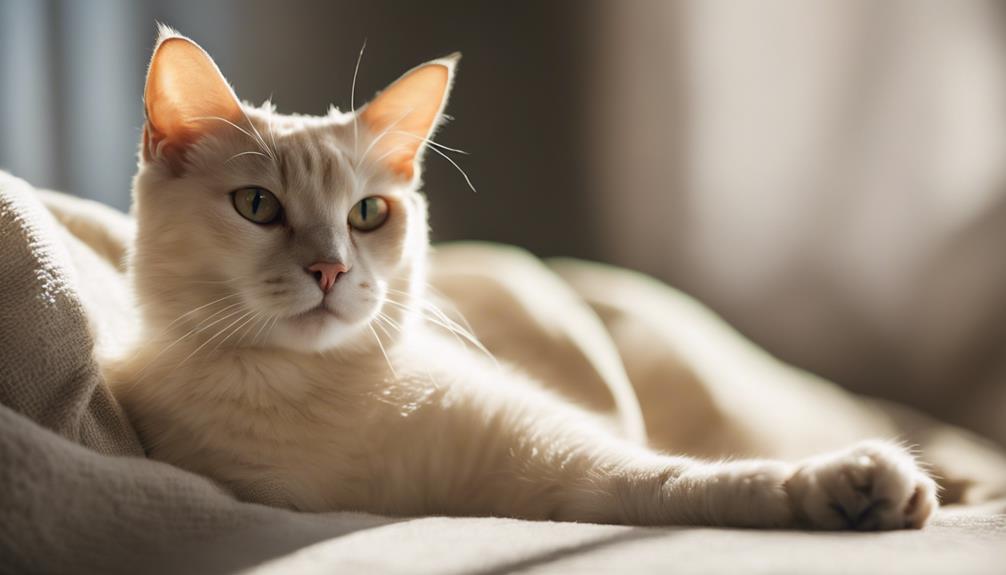Why Do Some Cat Breeds Live Longer?
Have you ever wondered why some cat breeds seem to have more lives than others?
While all felines are known for their grace and agility, certain breeds stand out for their exceptional longevity. From the elegant Siamese to the majestic Maine Coon, these breeds have captured the hearts of cat lovers worldwide.
But what sets them apart? The secret to their extended lifespans might lie in a combination of genetic factors, lifestyle choices, and environmental influences.
So, what makes these cats live longer, and how can we ensure our furry companions enjoy a purrfectly long life?
Siamese Cats
Siamese cats typically have a lifespan ranging from 12 to 20 years. When it comes to Siamese cat temperament, these felines are known to be affectionate, social, and vocal. They enjoy interacting with their human companions and aren't shy about expressing their opinions through loud meows. Siamese cats are often described as extroverted and intelligent, thriving on human interaction and playtime.
In terms of Siamese cat health concerns, there are a few issues to keep an eye on to ensure your feline friend lives a long and healthy life. One common health problem in Siamese cats is dental issues. Due to their genetic predisposition, Siamese cats can be prone to dental problems such as periodontal disease, making regular dental check-ups essential. Additionally, Siamese cats are known to be more susceptible to respiratory issues compared to other breeds. This means it's crucial to keep their environment free of smoke or other pollutants that could aggravate their sensitive respiratory systems.
Russian Blue Cats
Known for their striking silver-blue coat and captivating green eyes, Russian Blue cats are a breed renowned for their elegance and intelligence. When it comes to health benefits, Russian Blues are generally a robust breed with fewer known genetic health issues compared to some other breeds. This factor contributes positively to their longevity.
Russian Blue cats have a sleek and agile build, which often leads to a longer lifespan. Their average lifespan ranges from 15 to 20 years, with some living even longer when provided with proper care and a healthy environment. Regular veterinary check-ups, a balanced diet, and sufficient exercise are crucial for ensuring their well-being and longevity.
One of the longevity factors for Russian Blue cats is their predisposition to staying active and playful well into their senior years. This continuous activity helps maintain their muscle tone and overall health, contributing to a longer life expectancy. Additionally, their calm and affectionate nature reduces stress levels, which can positively impact their longevity.
Burmese Cats
With their sleek coats and expressive eyes, Burmese cats exude charm and grace, captivating all who encounter them. These cats aren't just beautiful companions; they also have specific health factors and genetic predispositions that can influence their longevity. When it comes to ensuring your Burmese cat lives a long and healthy life, consider the following:
- Burmese cats: health factors, genetic predispositions: Burmese cats are generally healthy, but like all breeds, they may be prone to certain genetic conditions such as hypokalemia (low blood potassium levels) and diabetes. Regular veterinary check-ups and genetic testing can help you stay on top of any potential health issues.
- Burmese cats: diet and exercise, environmental influences: A well-balanced diet and regular exercise are crucial for keeping your Burmese cat healthy and happy. These cats are playful and energetic, so providing them with opportunities to stay active can help prevent obesity and related health problems. Additionally, creating a safe and stimulating environment for your Burmese cat can contribute to their overall well-being and longevity.
Ragdoll Cats
Regularly praised for their gentle nature and striking blue eyes, Ragdoll cats are a popular breed among feline enthusiasts. When it comes to grooming requirements, Ragdolls have semi-long fur that's soft and silky. Despite their luxurious coat, they're relatively low maintenance in terms of grooming. A weekly brushing session should suffice to keep their coat free from tangles and mats. Additionally, regular nail trimming and ear cleaning are essential to ensure your Ragdoll remains healthy and comfortable.
In terms of personality traits, Ragdolls are known for their affectionate and docile nature. They're often referred to as 'puppy-like' cats due to their tendency to follow their owners around the house and seek out human companionship. Ragdolls are also quite sociable and enjoy being around people, making them great companions for families and individuals alike. They're typically relaxed and adaptable, which can help reduce stress in a household.
Sphynx Cats
After learning about Ragdoll cats and their gentle nature, let's now shift our focus to Sphynx cats. Sphynx cats are unique for their lack of fur, which often surprises people. Despite their distinctive appearance, Sphynx cats have several characteristics that make them a great addition to your family.
- Health benefits: Sphynx cats are known for their robust health. Their lack of fur reduces the risk of certain skin conditions that other cat breeds may experience. Additionally, their warm body temperature makes them great cuddle buddies, providing comfort and potential health benefits to their owners.
- Grooming needs: Due to their hairless nature, Sphynx cats require regular grooming to maintain healthy skin. While they may not need traditional brushing, they need baths to remove excess oils from their skin. Their ears also need cleaning to prevent wax buildup. Regular grooming routines help Sphynx cats stay clean and healthy.
Abyssinian Cats
Abyssinian Cats are known for their striking appearance and playful personalities. If you're considering adding an Abyssinian cat to your family, understanding their temperament and care requirements is crucial.
In terms of temperament, Abyssinian cats are often described as active, curious, and highly intelligent. They enjoy interactive playtime and mental stimulation, so be prepared to engage with them regularly to keep them happy. These cats are known for their outgoing nature and love to be involved in household activities. Providing them with puzzle toys or interactive feeders can help satisfy their need for mental challenges.
When it comes to care requirements, Abyssinian cats have a short coat that's relatively easy to maintain. Regular grooming sessions with a soft brush will help keep their coat shiny and minimize shedding. Additionally, providing them with a scratching post is essential to prevent them from damaging furniture. Abyssinians are generally healthy cats, but regular veterinary check-ups are still important to ensure they stay in top condition.
Manx Cats

If you're considering adding a Manx cat to your family, understanding their unique characteristics and care needs is essential. Manx cats are known for their distinct lack of a tail or having a short stub, a result of genetic mutations specific to this breed. Here are some key points to keep in mind:
- Unique Appearance: Manx cats stand out due to their tailless or short-tailed feature, which is a result of a natural genetic mutation. This distinct physical trait adds to their charm and appeal.
- Spinal Deformities: Due to their genetic makeup, Manx cats are prone to spinal deformities. It's crucial to provide them with a supportive environment and regular veterinary check-ups to monitor their spinal health.
- Care Considerations: When caring for a Manx cat, be mindful of their unique needs. Ensure they have a balanced diet, maintain a healthy weight to alleviate strain on their spine, and engage in regular play to keep them active and agile.
Understanding the genetic mutations that make Manx cats unique is vital in providing them with the appropriate care and attention they need to lead healthy and fulfilling lives.
Maine Coon Cats
Exploring the impressive size and friendly nature of Maine Coon cats showcases why they're a popular choice among cat enthusiasts. Maine Coon cats are known for their genetic diversity, which is believed to contribute to their longevity. This diversity helps reduce the prevalence of genetic disorders common in purebred cats, leading to a healthier overall population.
Environmental influences also play a significant role in the lifespan of Maine Coon cats. Being well-adapted to various environments due to their origin as working cats in the northeastern United States, they've developed a robustness that aids in their longevity. Their ability to thrive in different conditions and climates has helped them remain resilient and healthy.
Maine Coon cats aren't only one of the largest domesticated cat breeds but also one of the most affectionate and sociable. Their friendly demeanor and playful nature make them excellent companions, which can positively impact their overall well-being. The strong bond they form with their owners can also contribute to a longer and happier life.
Frequently Asked Questions
What Are the Common Health Issues That Siamese Cats May Face as They Age?
As Siamese cats age, common health issues may include dental care needs, arthritis management, weight management, and cognitive function.
It's important to monitor their dental health, manage arthritis with proper care, maintain a healthy weight through diet and exercise, and support cognitive function through interactive toys and mental stimulation.
Are Russian Blue Cats More Prone to Any Specific Genetic Conditions That Could Affect Their Lifespan?
Russian Blue cats are generally healthy and long-lived, with a lifespan of 15-20 years. They aren't prone to any specific genetic conditions that significantly affect their lifespan. These cats have a calm and gentle temperament, requiring minimal grooming.
In contrast, Siamese cats, known for their intelligence and vocalization, may face health issues like dental problems and respiratory conditions as they age. Regular veterinary check-ups can help ensure your Russian Blue or Siamese cat's well-being.
Do Burmese Cats Require Any Special Dietary Considerations to Help Them Live Longer?
To help Burmese cats live longer, consider their diet. Ensure they get proper nutrition through a balanced diet. Additionally, focus on weight management to prevent obesity-related health issues.
Regular exercise routines and behavioral enrichment can also contribute to their overall well-being. Supplements may be beneficial, but consult with your vet before adding any to their diet.
What Are Some Unique Characteristics of Ragdoll Cats That May Contribute to Their Longevity?
Ragdoll cats have a gentle temperament, which can lead to less stress and better overall health. Their grooming habits also play a role in their longevity, as regular grooming can prevent health issues.
Siamese cats' lean body structure requires exercise to maintain muscle tone, contributing to a longer lifespan. By understanding these unique characteristics and providing proper care, you can help your Ragdoll cat live a longer and healthier life.
Are There Any Specific Environmental Factors That Could Impact the Lifespan of Sphynx Cats Compared to Other Breeds?
If you have a sphynx cat, consider these factors for their lifespan:
- Indoor vs outdoor living affects their safety and exposure to dangers, like traffic or predators.
- Sphynx cats are sensitive to temperature changes, so ensure a cozy environment.
- Their lack of fur means grooming is essential for skin health.
- Providing socialization benefits their mental well-being.
These considerations play a role in the lifespan of sphynx cats compared to other breeds.
Conclusion
So, now you know why some cat breeds tend to live longer than others. Factors such as genetics, diet, exercise, and overall health play a significant role in determining a cat's lifespan.
By understanding these factors and providing proper care and attention, you can help ensure that your feline companion lives a long and healthy life. Remember, every cat is unique, so it's important to tailor your care to their individual needs.
